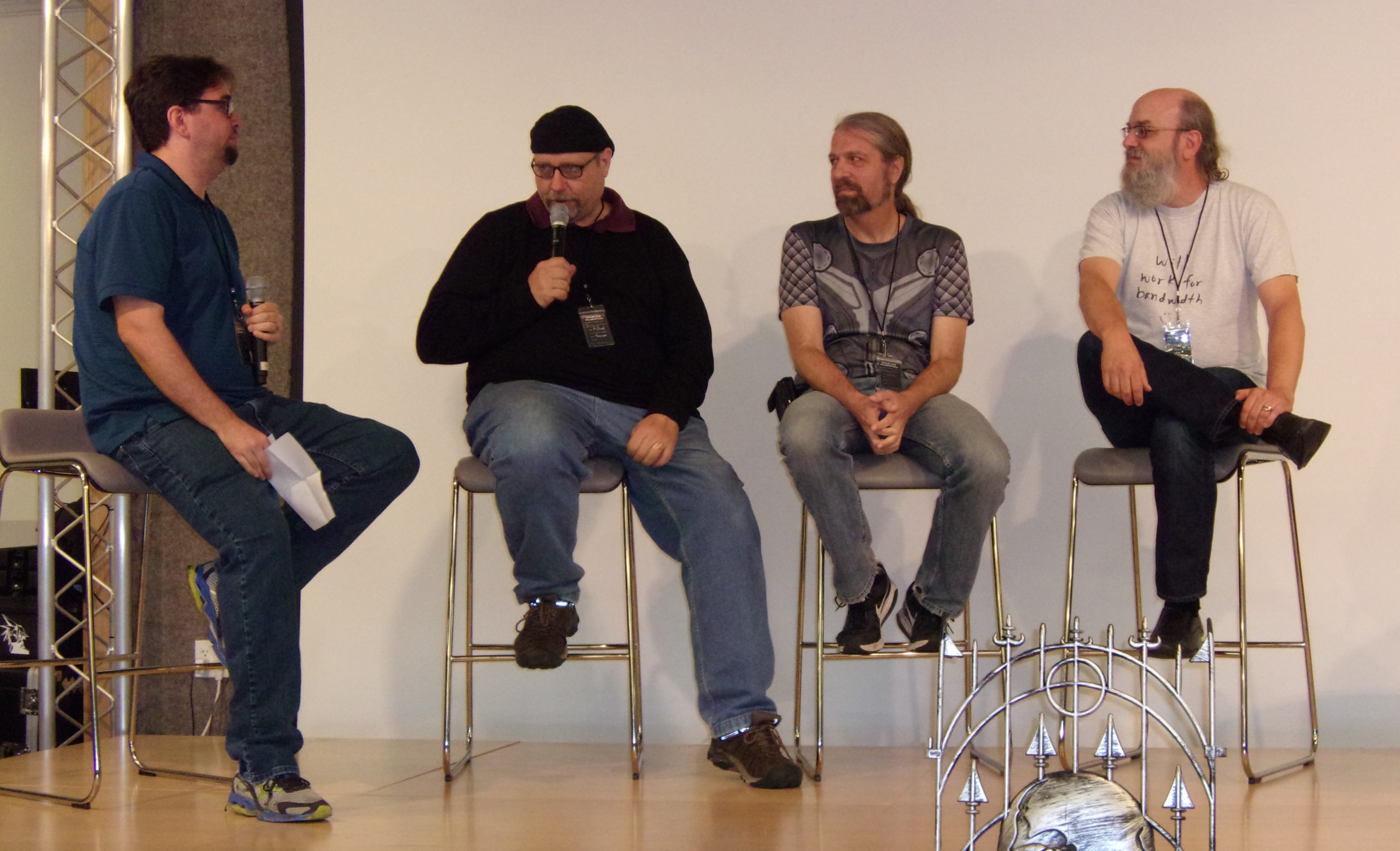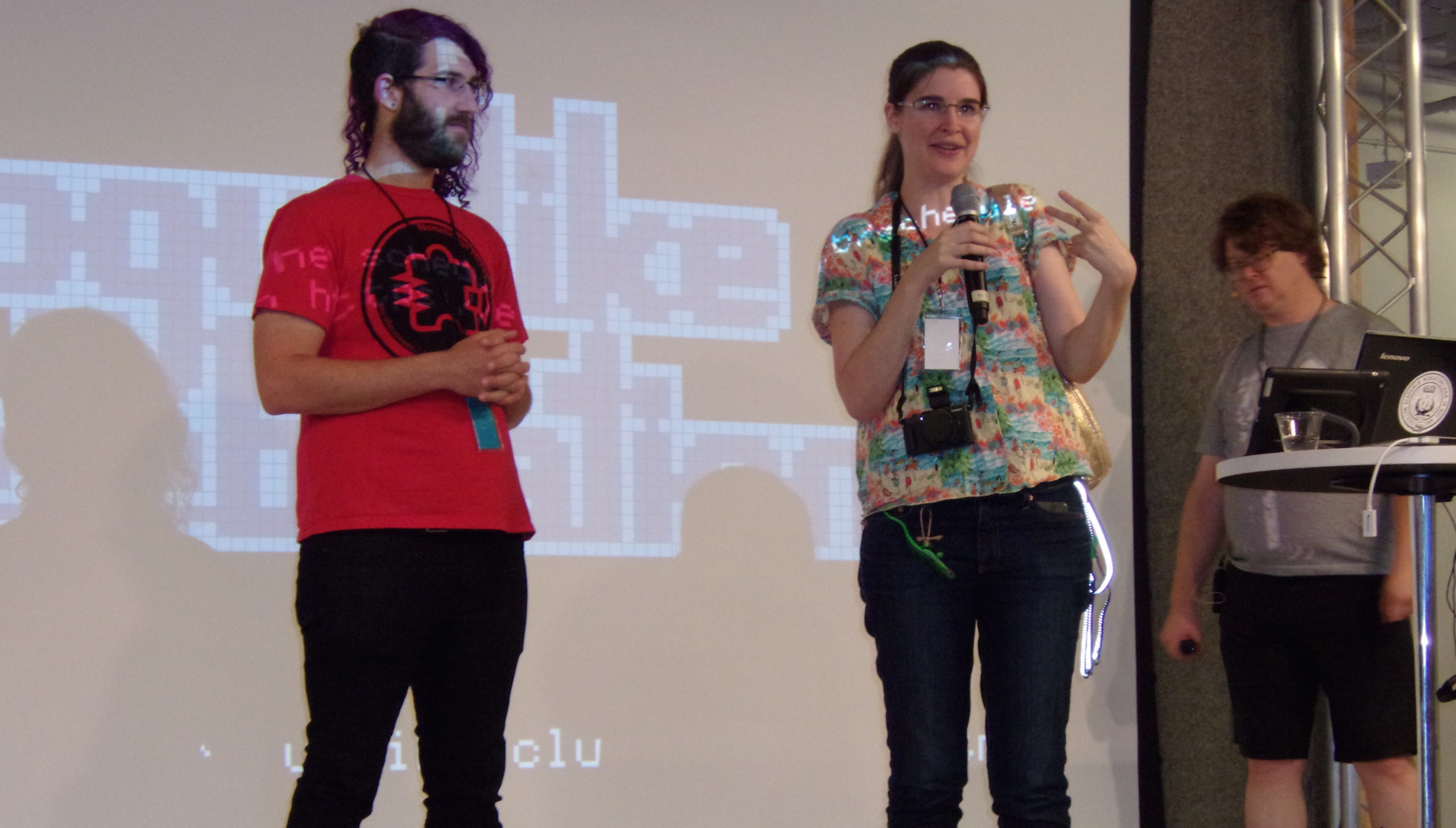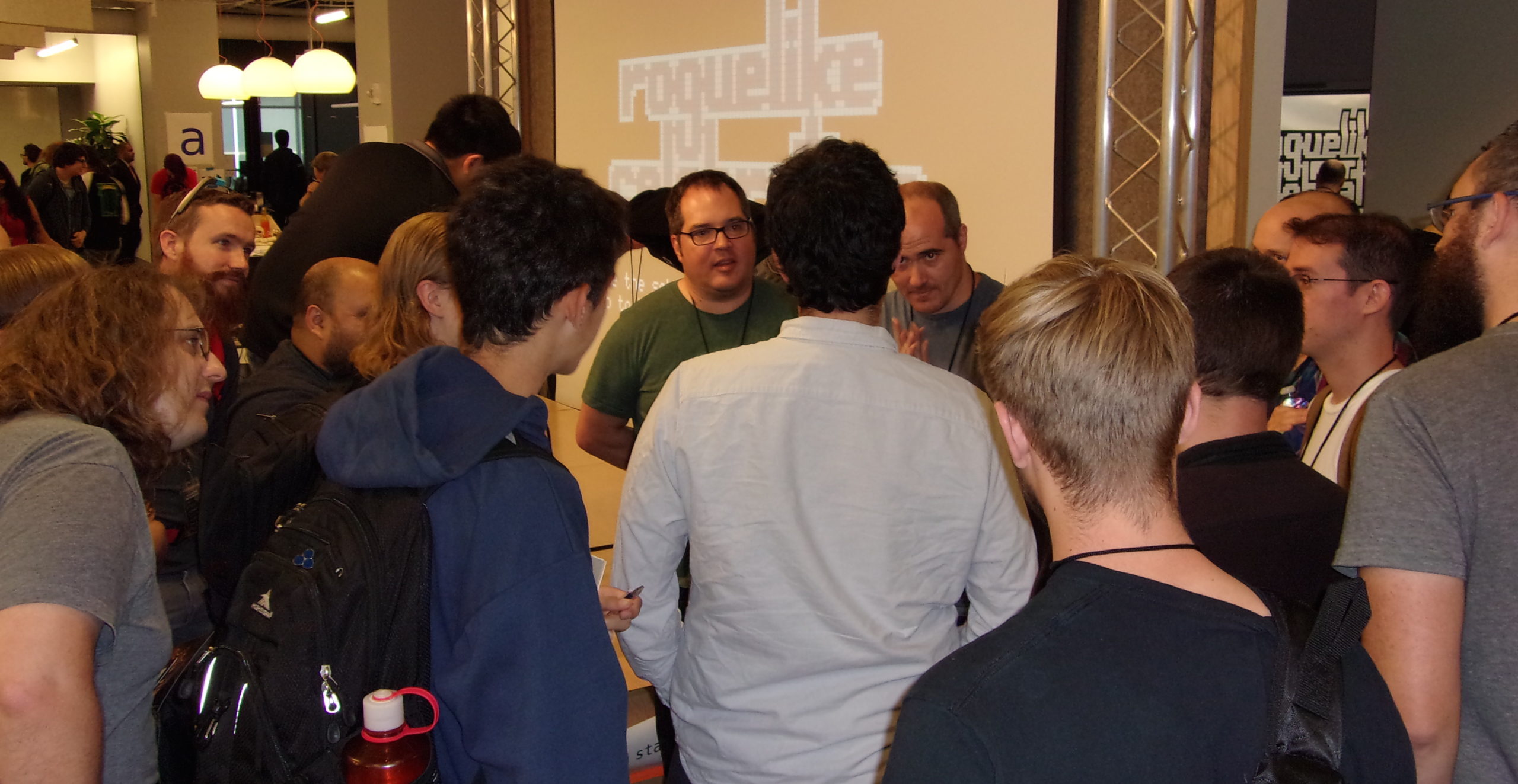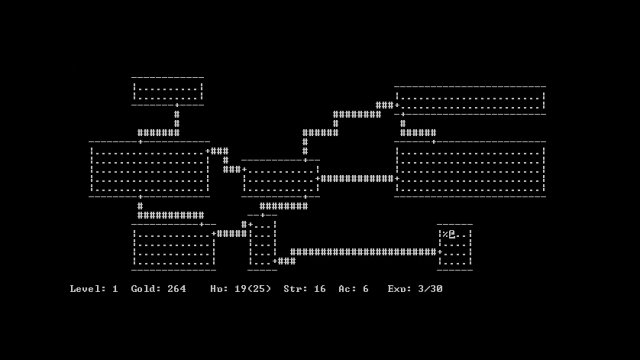“You’re going to the event called… ‘roguelike?’” the security guard asked.
The incredibly influential game Rogue, via Wikipedia.
“Yes,” said the bespectacled nerd in a black Dungeons & Dragons t-shirt, standing next to me at the sleek Eventbrite offices in San Francisco’s SoMa neighbourhood. The full name of the daylong conference we were attending was “Roguelike Celebration,” but the guard had gotten close enough.
“So you gotta like rogues?” joked the guard.
“Well, I like the game called Rogue,” said the nerd, but the elevator doors were already closing between us and the guard. He didn’t really care. Most people don’t. It takes a certain kind of enthusiast to spend their Saturday listening to developers and fans pontificate about the dense, twisted family tree of games descended from Rogue, the genre-defining 1980 gaming classic by Michael Toy, Glenn Wichman, and Ken Arnold.
I paid $US37.92 ($50) to attend and filled out my nametag as Tony, Alignment: Chaotic Neutral. For the price of admission, I got a t-shirt, a pair of socks festooned with the @ sign, two similarly themed lapel pins, and the opportunity to see Toy, Wichman, and Arnold reunite onstage for the first time in 30 years.

Dungeon Hacks author David Craddock interviews Rogue creators Michael Toy, Glenn Wichman, and Ken Arnold.
Rogue wasn’t the first game set in a dungeon with an overhead perspective. Sword of Fargoal and Beneath Apple Manor preceded it. But it would become one of the most influential, largely because it was included in 1984’s BSD Unix distribution. “If you can get that kind of distribution — like, you’re on the operating system? If you have that opportunity, I would say, take it,” Wichman said, to riotous laughter. “We were the Minesweeper of Unix,” Toy chimed in. The 1985 commercial release by Epyx flopped, according to Toy, but that didn’t matter. Rogue was out there, and, 36 years later, its progeny are more popular than ever.
“Half the things on Steam call themselves roguelikes, including a number of things where the connection is kind of tenuous,” said John Harris, author of the long-running column @Play. He’s right. Once the stuff of a hipstery subculture, roguelikes are mainstream now, and many games that lay claim to the name bear little if any resemblance to Rogue.
Some people find the ongoing debate over the definition of “roguelike” tiresome, but it provides opportunity to talk about which gameplay elements matter most to us. Does a roguelike need to be turn-based? Should you be limited to just one character, or can you control a party? Do the environments need to be randomised? What about “permadeath?”
“We need a different name from ‘permadeath,’” Rogue co-creator Glenn Wichman said. “When people talk about permadeath, they talk about us three being mean. ‘Oh, they wanted to make it extra hard, so they threw in permadeath.’ [But] permadeath is [just] an example of ‘consequence persistence.’ Do I read this scroll, do I drink this potion? I don’t know. It might be good. It might be bad. If I can save the game and then drink the potion and — oh, it’s bad — then I restore the game and I don’t drink the potion. That entire game mechanic just completely goes away. So that was a whole reason why, once you have taken an action and a consequence has happened, there’s no way to undo it. Permadeath is not the right name for that, so that’s my homework to all of you: come up with a better name.”
“We were trying to make it more immersive by making things matter, but not to make it more painful,” added Toy. “It was really meant to make it more fun: ‘This thing matters, so I’m going to think about this.’”
“The good stuff is just as permanent as the bad stuff,” said Wichman.

Roguelike Celebration organisers Noah Swartz and Britta Gustafson (dressed as a Nethack “tourist” character), with @Play columnist John Harris waiting to speak.
Another highlight of the day was Dungeon Crawl: Stone Soup developer Nicholas Feinberg’s cogent, literary, and brilliantly funny presentation on the struggle all strategy developers face against the “hypothetically optimal player,” who will endure extreme tedium if it provides even the slightest tactical benefit. An example is Nethack’s “pudding farming,” which was patched out of the most recent release. Games that unintentionally reward tedious play, he said, put “the fun way to play in conflict with the way to play that makes you most likely to win.”
Feinberg explained something that I’ve always felt but hadn’t been able to put into words: that, even for the player who would never dream of actually doing anything like “pudding farming,” the very existence of such an exploit is still a problem. In a game where the player’s character is going to die, you want the death to be meaningful. You want it to inspire the player to think about what he or she did right and wrong, and plan what they might do differently in the next run. If that “different thing” is fleeing from a challenging fight or finding a useful item, “that’s a fun way to die. What’s not fun is dying and thinking, ‘Oh, if only I’d sat in a corner for several hundred turns to train Fire Magic.’”
Dwarf Fortress provided Feinberg with a particularly egregious example of repetitive “optimal” play. “I’ve seen players suggest a training regimen that involves wrestling with a crab while arguing with a bard, and then every time the crab collapses from exhaustion, you take a break to dance.” Feinberg conceded that since there’s no way to win Dwarf Fortress, “optimal play” in that game isn’t as much of a concern. “What are you optimising for?” he joked. But his point was made.
The creators of Dwarf Fortress, Zach and Tarn Adams, also gave a talk. Afterward, they were swarmed by adoring fans desperate for a moment of facetime. “Am I the only one entirely infatuated by Tarn?” a viewer of the Twitch livestream had commented. “What a sexy man.”

Dwarf Fortress developers Zach and Tarn Adams mobbed by fans.
Fame can have a dark side, even for roguelike developers. Thomas Biskup, creator of the 22-year-old game ADOM, gave a heartfelt talk that touched on the death threats he’d received when he declined to release ADOM’s source code (really). And, while he’s had many positive encounters with fans, he also recounted an occasion when a dozen avid ADOM players stalked his home in Germany. He wasn’t there at the time, but his mother was. Biskup seems to have a sense of humour about these travails, but I found them chilling.
Roguelike Celebration was created by Noah Swartz, an Electronic Frontier Foundation employee whose love of Nethack was rekindled a couple years ago. Swartz enlisted some of his friends to help put the event together, all of them “San Francisco nerdpeople,” as one such friend, Britta Gustafson, put it to me. About 200 fellow nerdpeople showed up, and Swartz is donating all the profits to Noisebridge, a local nonprofit that focuses on hacking education. Swartz told me he was noncommittal about future Roguelike Celebrations, and wouldn’t rule it out. Based on the success of this one, I suspect there will be more. Maybe at next year’s Roguelike Celebration, someone will unveil the word that renders the term “permadeath” obsolete once and for all.
Tony Carnevale will never, ever wrestle a crab.

Comments
6 responses to “Rogue Creator Says We Need A Better Word For Permadeath”
I hate ‘roguelikes’ for exactly the same reasons these strange people like them. I will never waste my time playing one again.
Depends on the actual game for me. The term ‘roguelike’ has been bastardised so much that Diablo is effectively ‘roguelike’ just because it has a random dungeon element to it. Which misses what roguelike games were originally meant to be.
So what do you consider roguelike to the point of not wasting time? Something like the original, or do others at the opposite end of the spectrum get left out as well?
Not taking a shot at you by the way, its a genuine question.
Seems kinda weird to have a genre title based on a specific game nowadays – it’d be like if platformers were called ‘Mariolikes’ (even though a lot of Mario games aren’t platformers anymore) – same sort of issue with ‘Metroidvania’ (which is more ‘gear-gated exploration/platformer’ as opposed to Legend of Zelda being a ‘gear-gated exploration/adventure’)
I always thought it might make more sense to call the Roguelite/Roguelike-likes something like Procedural Death Engines (accounting for the randomness and permadeath without binding to turn-based dungeon crawling); Rogue would therefore be a PDE/RPG, Spelunky a PDE/Platformer, Nuclear Throne a PDE/Twinstick etc.)
Rogue-death?
NES mode?
Re: Zero?
no one has a problem with the use of the word ‘nerd’ in this context?
““Yes,” said the bespectacled nerd”
“Well, I like the game called Rogue,” said the nerd
Just complained about this today after seeing the trailer or whatever you want to call it for Tumbleseed… Not that it looks like a bad game, actually looks neat, just the fact it calls itself a rogue bugs me. Rogue like is a terrible name for a genre especially because how loosely it is thrown at games lately. When I think of a rogue like I think of Dwarf Fortress, Dungeon Crawl Stone Soup, Caves of Qud, Cataclysm DDA and really how close are most of these examplea even? We have a naming convention in place already such as mmo, rpg, mmorpg, jrpg, fps and the likes… why not stick with that and go with pghcrpg, proc gen hard core role playing game. Hard core for the perma death, sounds cool and better than pghcrpg.